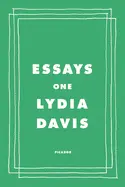
Essays One - by Lydia Davis
ISBN: 0374148856Date read: 2022-10-15
How strongly I recommend it: 4/10
(See my list of 430+ books, for more.)
Go to the Amazon page for details and reviews.
Author talks about her methods, and the craft of writing.
my notes
Experimental implies that the writer had a plan to test some preconceived writing strategy and see if it would work; that what resulted might or might not prove anything, and might or might not be successful.
Writing within an artificially imposed constraint.
Today I have learned a great lesson. Our cook was my teacher. She is 25 years old and she’s French. I discovered, when I asked her, that she did not know that Louis-Philippe is no longer king of France and we now have a republic. And yet it has been 5 years since he left the throne. She said the fact that he is no longer king simply does not interest her in the least - those were her words. And I think of myself as an intelligent man! But compared to her I’m an imbecile.
I like to understand things and tend to ask questions of myself or another person until there is nothing left that I do not understand.
Auto-fiction (“self-fiction”), the narration of one’s own life, lifted almost unchanged from the reality, selected and judiciously, artfully told.
In my communications to her, though to no one else, I tend to put certain words into quotation marks, as for instance “society,” “we,” “poetry,” “happiness.”
Why to Rae in particular, and what do the quotation marks do?
They draw attention to a word; they acknowledge the “received” meaning of the word.
They also indicate an awareness of complexities of meaning or contradictions often ignored by the common usage of the word.
Translating poetry is impossible.
All the best things are.
Takes the mystery out of eloquence, by showing you how the magic works.
I should reverse that order and end on a stranger note.
It is a better order not only because it is more absurd but also because it is more surprising.
Subtly, or less subtly, you always want to surprise a reader.
You certainly don’t want the reader to predict exactly where you’re about to go.
Qualifying words like quite and rather and very - you probably could benefit by taking them out.
End with the more surprising or stronger element.
You may see that your best ending is somewhere up the page - that you were finished before you thought you were.
The title is essential to place the reader before the beginning of the piece.
Work hard on the very last words - they can sometimes make all the difference - (as to whether or not a story or poem seems finished.)
When you revise a sentence you are revising not only the words of the sentence but also the thought in the sentence.
By getting a certain description exactly right, I am sharpening the acuteness of my observation.
Every story is written entirely in the notebook.
In the notebook nothing has to be permanent or good. Here I have complete freedom and so I am not afraid.
I could write in whatever way I wanted.
For a while I pushed myself out of a dry spell by writing two paragraph-long stories every day.
I don’t deliberately set out to write stories.
The notebook is a place to get rid of everything.
The more exactly I put it down the more completely I get rid of it.
You can’t do anything well if you feel cornered.
READ:
Charles and Mary Lamb’s "Tales from Shakespeare"
The Voice Imitator, translated by Kenneth J. Northcott. It contains 104 stories, each a paragraph long.
Thomas Bernhard
Flannery O’Connor’s “Everything That Rises Must Converge"
Isaac Babel’s “You Must Know Everything”
Kafka’s “The Burrow”
Small but Perfectly Formed: Five Favorite Short Stories
“Dante and the Lobster,” by Samuel Beckett.
“Wants” story by Grace Paley, because of her brilliantly dense style, her economy, her humor, and the generous reach of her spirit.
Virginia Tufte’s Artful Sentences: Syntax as Style.
Lucia Berlin based many of her stories on events in her own life.